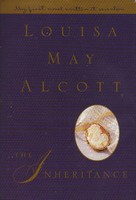Written in 1849, first discovered in 1988 and published in 1997, The Inheritance, as expected, is a breath of fresh air. This is no surprise, considering the era in which it was written, when writers consistently wrote with dignity, delicacy, insight, and restraint. It is considered Alcott’s first novel, written when she was only seventeen years old.
My first reaction, as the plot unfolded, was that this story reminded me of MansfieldPark, by Jane Austin. In both stories, the heroine, a poor girl of low status with the highest of character, is indebted to the unkind head of the household, but is befriended and defended by the hero, a rich, honorable authority in the household. The ending was a bit common and predictable, but the details, reactions and the uprightness of her characters were not.
It’s a lovely book, but not perfect. I wouldn’t usually be excited about reading a novel that began with a detailed description of a house and its landscape, yet the opening sentences show that this type of flowery description must have been popular in that time:
“In a green park, where troops of bright-eyed deer lay sleeping under drooping trees and a clear lake mirrored in its bosom the flowers that grew upon its edge, there stood Lord Hamilton’s stately home, half castle and half mansion. Here and there rose a gray old tower or ivy-covered arch, while the blooming gardens that lay around it and the light balconies added grace and beauty to the old, decaying castle, making it a fair and pleasant home. The setting sun shone warmly…”
During the first third of the book I was actually impatient, because we were seeing scene after scene which demonstrated with exaggeration just how good and sweet and self-sacrificing Edith Adelon is, how much the same is Lord Percy, and how much he loves Edith from the start. It’s a little too much for me, when a man reacts so decidedly, so quickly, toward a woman. And it is always hard to get into one of these eighteenth or nineteenth century stories about people who sit around all day, looking for ways to amuse themselves, because none of them has any kind of job or responsibilities to speak of. (Even if they are rich, don’t they have some contribution to make to the household or society?)
Again, the author shows her mastery of suspense. As soon as the conversations start, and we find out something tragic happened to the awaited Lord Percy, and we start to see the envy and evil in Ida, it is impossible to put down. The good and evil are sharpened, and go to extremes as the story goes on, and the reader can hardly believe (in a good sense!) how rotten some characters can be and how angelic and suffering Edith can be.
A little mystery is added with the arrival of an unidentified elderly man, and soon after Edith burns all chances of ever having any financial security or standing in life. We are in awe of her complete lack of selfishness, and frightened at such a level of undeserved trust.
I enjoyed every page of this high quality book. But what makes it so extraordinary?
First, the focus of the heroine is different from that of a typical contemporary book: instead of seeking love, security, power, respect, revenge, or any other “worthy” goal (by some standards), Edith seeks the good of others. She seeks to serve and to sacrifice, and she is grateful, humble, gentle, truthful, and disciplined. How uplifting.
Second, she admires a man with the same qualities as her. Most contemporary heroines admire a man who has wealth, power, prestige, and good looks, but rarely does the heroine know much about his moral character and inner strength and convictions. Edith respects a man who respects her. The concept of “love” in this period of books is also different. Love in The Inheritance is based on what is inside, instead of what is on the outside.
Third, the expression of love is in good deeds and kindnesses in this novel, whereas contemporary fiction usually shows love expressed in sensual physical contact.
The fourth extraordinary quality relates to my pet peeve with fiction, a lack of believability. Although it is certainly made up of idealistic, romantic characters, I found the dialogue, plot and events realistic and natural.
This widely available book is a treasure, ideal for a young girl. An A+.
An interesting note: according to the scholars who found the manuscript in Harvard’s Houghton Library in 1988, The Inheritance is the novel Jo March writes in Little Women. To read an interesting article about the discovery of this manuscript, click here.


2 thoughts on “Louisa May Alcott’s First Novel, The Inheritance”